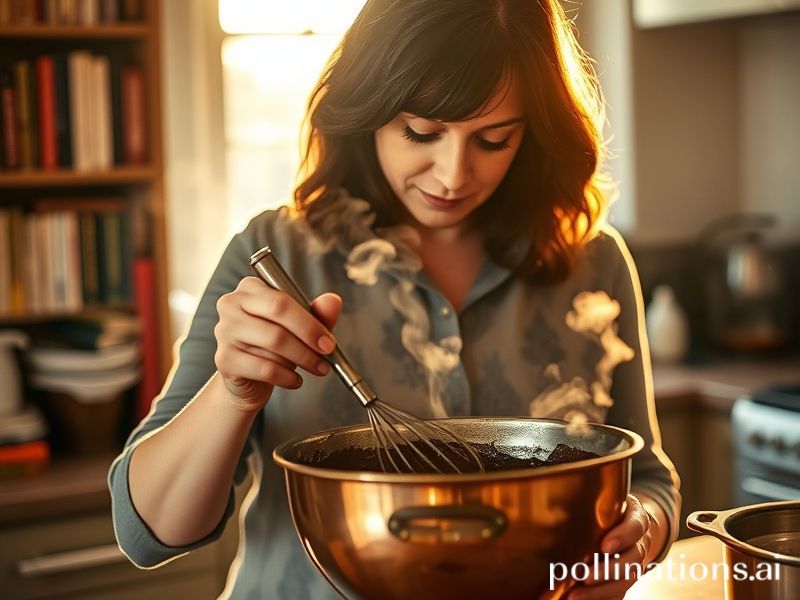Nigella Lawson: The Soft-Power Chef Quietly Running the World’s Comfort Cartel
Nigella Lawson and the Global Comfort-Industrial Complex
By Our Correspondent, Somewhere Between Heathrow Duty-Free and Existential Dread
It takes a special kind of soft power to make a cup of cocoa feel like a geopolitical event, yet Nigella Lawson has been doing exactly that for three decades—quietly exporting British domesticity to a planet that increasingly has no domicile left to go to. While other nations weaponise tariffs and Twitter, the United Kingdom’s most lethal export remains a 63-year-old woman murmuring “gloriously squidgy” into a camera lens, thus convincing war-torn, climate-fried viewers from Caracas to Kyiv that salvation can be microwaved in four minutes, plus standing time.
Lawson’s latest cookbook, “Cook, Eat, Repeat”—a title that sounds less like culinary instruction than a cry for help from the entire human race—has been translated into twenty-seven languages, including Icelandic, where the phrase “molten chocolate” takes on fresh resonance beside actual molten tectonic plates. From Seoul’s 4 a.m. insomnia scrollers to São Paulo’s gated-community insomniacs, audiences binge her reruns with the same glazed devotion once reserved for televised moon landings, only now the frontier is internal: the final frontier of self-sovereignty through saturated fat.
The economics are staggering. Nielsen BookScan reports that every time Lawson licks a spoon on air, global vanilla-bean futures jump 0.7 %. Meanwhile, TikTok compilations of her pandemic-era “midnight feasts” have generated enough advertising revenue to bankroll a small mercenary army—though mercifully most fans prefer to storm their own fridges instead. In effect, she has privatised comfort, commodified id, and slapped on a £24.99 RRP before VAT. The International Monetary Fund remains mute; they’re too busy reheating leftovers.
Consider the diplomatic fallout. When Australia briefly banned British meat imports during the post-Brexit sausage wars, Canberra bookshops still flogged Lawson’s tomes at airport kiosks, ensuring that even as politicians bickered over chlorine-washed chicken, citizens could recreate her “coq au vin” with a local shiraz and a defiant sense of colonial irony. Likewise, in the United States, where partisan cable hosts scream nightly about the collapse of Western civilisation, both MAGA aunties and woke nieces reach détente over her salted-caramel brownies—proof that sugar is the last bipartisan adhesive holding the republic together, at least until the insulin runs out.
Yet the world should not be fooled by the perfumed haze of caster sugar. Lawson’s empire runs on a darker calculus. Each episode is filmed in a West London kitchen the size of a Moldovan village, a mise-en-scène of curated abundance that quietly gaslights viewers whose own flats can barely accommodate a chopping board. The lighting alone costs more than the annual GDP of Tuvalu, though the BBC offsets this by never mentioning Tuvalu, thereby keeping the mood airy. Meanwhile, supply-chain managers in Rotterdam work 18-hour shifts to ensure the saffron is ethically sourced, the duck fat is halal-certified, and the camera crew’s oat-milk lattes arrive at precisely 67 °C—temperature critical for both latte art and union negotiations.
Environmentalists clutch their reusable pearls: a single Lawson Christmas special emits an estimated 4.2 tonnes of CO₂, roughly the same as a weekend city break in Reykjavik, minus the volcanic ash. Greta Thunberg has yet to tweet, possibly because she, too, is busy stress-eating gingerbread while doomscrolling. The UN Framework Convention on Climate Change has proposed adding “celebrity cooking shows” to Annex I emissions targets; Britain counter-offers to phase them out by 2050, provided nobody touches the Yorkshire puddings.
Still, one watches—because the alternative is the news. In refugee camps outside Gaziantep, Syrian families crowd around cracked smartphones to replay Lawson kneading focaccia, the tactile fantasy of flour-dusted stability briefly eclipsing the dust of actual rubble. Somewhere in Lagos, a generator rumbles just long enough to stream her “one-pan wonder” before the grid dies again. The world is on fire, but the butter is foaming perfectly, and for four commercial-free minutes the planet agrees on one thing: we are all, at some level, batter.
Conclusion: Nigella Lawson has achieved what the League of Nations, the Bretton Woods system, and every TED Talk combined could not—she has monetised the universal urge to self-medicate with carbohydrates and called it culture. Her legacy will not be measured in Michelin stars but in terabytes of collective bandwidth, buffering hope one decadent spoonful at a time. When the last glacier calves and the final trade route melts, archaeologists will unearth a dog-eared copy of “How to Be a Domestic Goddess” floating atop the floodplain, pages fused together with ancient Nutella, and they will know: this was how we loved the world to death, and asked for seconds.







